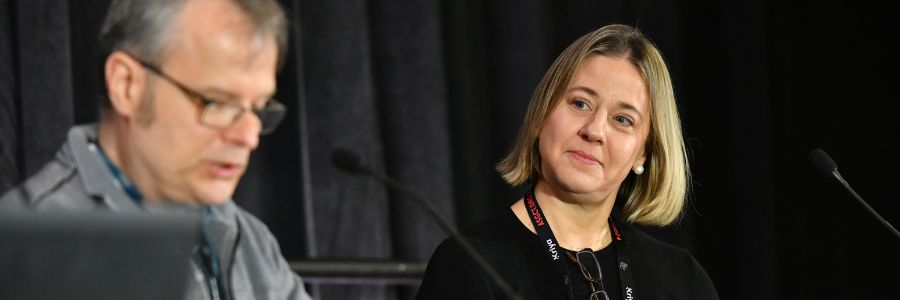Inclusive Trial Design Amplifies Patient Voices and Drives Meaningful Outcomes
Samuel Hughes, MBA, St. Jude Children's Research Hospital - June 18, 2024
Overcoming recruitment, endpoint, and resource challenges in rare disease trials was the focus of the workshop organized by the Patient Outreach Committee at the ASGCT 27th Annual Meeting.
 Maria Santaella, PhD (c), MSN, RN-BC, CPHON serves as the Vice President of Research for the National Bleeding Disorders Foundation. During the workshop she spoke on clinical trial enrollment by sharing strategies to address barriers in recruiting.
Maria Santaella, PhD (c), MSN, RN-BC, CPHON serves as the Vice President of Research for the National Bleeding Disorders Foundation. During the workshop she spoke on clinical trial enrollment by sharing strategies to address barriers in recruiting.
"
In the United States, 10% of the population is affected by rare diseases. Of the approximately 10,000 confirmed rare diseases, 95 percent have no effective treatment options. This stark reality underscores the crucial role of clinical trials in developing new treatments, particularly cell and gene therapies (CGT) for rare diseases. These trials, however, face unique design challenges compared to standard research trials, including recruitment limitations, insufficient patient populations, inadequate endpoints, and lack of resources. These challenges, if not addressed, can significantly hinder clinical development, making the insights from this workshop all the more valuable.
Treatment developers must carefully consider each step of the clinical trial design process to maximize successful outcomes for individuals with rare diseases. The workshop planned by the Patient Outreach Committee at the American Society of Gene & Cell Therapy's (ASGCT) 27th Annual Meeting explored strategies to overcome many of the unique challenges the rare disease and research communities face. Presenters shared how they work with patient groups to pioneer innovative strategies in the trial design process and how leading with the end in mind is crucial to optimizing rare disease clinical trial success.
The presenters highlighted the importance of a patient-centered approach when designing clinical trials for rare diseases. Such an approach includes utilizing lived experience data from patients in their daily lives and the scientific data needed to understand the natural biology of a disease when dealing with a small population. They explored ways to engage and meet directly (or virtually) with patients and their families to help inform endpoints based on a particular community's concerns and desired treatment outcomes. Presenters gave insights on the importance of engaging these stakeholders to develop core outcome sets, which are focused outcomes identified by stakeholders and used consistently across clinical trials to minimize bias when reviewing endpoints. Every related trial should be designed around these outcomes, possibly involving modifying or validating existing measures. Speakers also presented an argument-based approach for the clinical outcome measure or endpoint development. If aspects of the disease are difficult to measure objectively but are still relevant to the population, researchers could combine this data with other evidence from patients and/or caregivers to better measure the effectiveness of a CGT.
During a recent written testimony, ASGCT President-Elect Terry Flotte, MD, described one example of this approach and expressed how vital flexible and collaborative approaches to improving safety and efficacy assessments are for patients in CGT trials.
Underpinning all these concepts was the need to lead with the end in mind to manage resources along the way. Presenters stressed the importance of concurrent clinical programs running alongside preclinical work to help identify gaps in knowledge and inform preclinical efforts before getting too far along in the development process. Thorough natural history studies, which can also help facilitate early engagement with the FDA, were highlighted as a key strategy. This early engagement can potentially save time and resources in later trial phases, a significant benefit for all stakeholders involved in rare disease clinical trials.
Patient organizations, industry stakeholders, regulatory professionals, and researchers play vital roles in developing new treatments. The Patient Outreach Committee Workshop during the 27th Annual Meeting shared how important it is to establish solid relationships and connect with participants and patient advocacy groups throughout the clinical trial design and development process. These relationships allow researchers to gain insight into the patient experience and more effectively tailor their research efforts. The rare disease communities and many other stakeholders will continue to improve processes to drive innovative treatments toward success. To learn more about the approval pathway and how the clinical trial process works, please visit patienteducation.asgct.org.
Related Articles